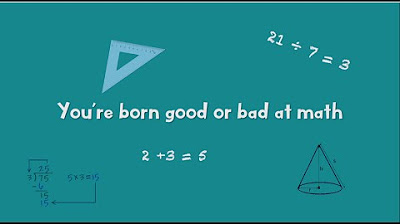Are You Smarter Than a 5-Year Old? Preschoolers Can Do Algebra, Psychologists Find
Summary
TLDRResearchers at Johns Hopkins University's Laboratory for Child Development have discovered that preschoolers possess the ability to engage in basic algebraic reasoning before formal math training. The study reveals that children aged four to six can intuitively infer the quantity of hidden objects, demonstrating a natural understanding of algebraic concepts. This skill is not limited to humans; various animals also exhibit similar intuitive number sense. The findings challenge the notion that algebra is inherently difficult, suggesting that basic mathematical reasoning is an innate capability present from early childhood.
Takeaways
- 😀 Preschoolers can engage in basic algebraic reasoning before formal math training.
- 😀 The research was conducted at Johns Hopkins University's Laboratory for Child Development.
- 😀 Children can use their intuitive number sense to infer hidden quantities in experimental tasks.
- 😀 The study involved four to six-year-olds reasoning about objects hidden in two cups.
- 😀 Children are solving for unknowns (x or y) using an approximate number system, not explicit counting.
- 😀 This ability to reason mathematically is present from early childhood and possibly from birth.
- 😀 Numerous other animals, including mice and monkeys, exhibit similar intuitive number sense.
- 😀 The findings challenge the notion that algebra is inherently difficult for young learners.
- 😀 The research suggests that intuitive mathematical skills can be harnessed to enhance early education.
- 😀 This study may lead to a reevaluation of how mathematical concepts are introduced to children.
Q & A
What was the primary focus of the research conducted at Johns Hopkins University?
-The research aimed to explore preschoolers' ability to reason algebraically before they have any formal math training.
At what age did the researchers test children's algebraic reasoning skills?
-The researchers tested children aged four to six years old.
How did the children demonstrate their algebraic reasoning skills in the study?
-Children inferred how many objects were hidden under two magic cups, effectively solving for variables without counting.
What is meant by 'approximate number system' as discussed in the transcript?
-The approximate number system refers to an intuitive ability to perceive and reason about quantities without exact counting.
What significance does the study find in the ability to solve for 'x' or 'y'?
-It shows that basic algebraic computations can be solved intuitively, indicating a natural mathematical understanding in young children.
What traditional view of algebra does this research challenge?
-The research challenges the view that algebra is inherently difficult and that children struggle with it until later grades.
What broader implications does this research suggest about animal cognition?
-The study suggests that the intuitive sense of number is not exclusive to humans, as various animals also display similar abilities.
What role does formal instruction play in the findings of this study?
-The study suggests that children can grasp basic algebraic concepts intuitively, indicating that formal instruction may not be necessary for early understanding.
How might this research impact early childhood education practices?
-It could lead to new teaching methods that leverage children's natural number sense to enhance early math education.
What types of animals were mentioned as having an intuitive sense of number?
-The research mentions mice, fish, and monkeys as examples of animals that exhibit a similar intuitive sense of number.
Outlines

This section is available to paid users only. Please upgrade to access this part.
Upgrade NowMindmap

This section is available to paid users only. Please upgrade to access this part.
Upgrade NowKeywords

This section is available to paid users only. Please upgrade to access this part.
Upgrade NowHighlights

This section is available to paid users only. Please upgrade to access this part.
Upgrade NowTranscripts

This section is available to paid users only. Please upgrade to access this part.
Upgrade NowBrowse More Related Video

Top MS Programs Without GRE 🏆| GRE Not Required Universities ✅

Translating Evidence into Practice - The Johns Hopkins Nursing Experience by M. DeGrazia, K. White

Using Math Talk to Support Learning (e-clip)

Why Studying the History of Science is Important

Teknologi AI Untuk Diagnosa dan Obati Kondisi Medis Serius

Myths About Math
5.0 / 5 (0 votes)